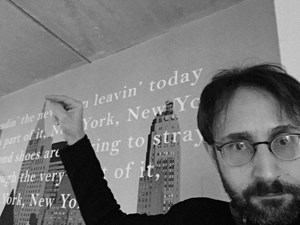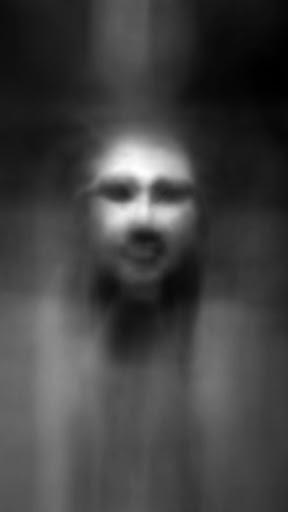
I’m an artist who makes videos, installations, performances, prints. My undergraduate degree is in Computer Science, and my graduate degree is an MFA in Art Criticism. So I am a person who is “good at computers”, but who has spent a lot of time thinking about art, technology, aesthetics, and politics. I use my programming abilities to create art that is connected to the theoretical and critical positions that interest me: the nature of images, the power of the archive, and the nexus of the political and the spiritual.
Kurt Ralske
1967
New York
Who are you?
I’m an artist who makes videos, installations, performances, prints. My undergraduate degree is in Computer Science, and my graduate degree is an MFA in Art Criticism. So I am a person who is “good at computers”, but who has spent a lot of time thinking about art, technology, aesthetics, and politics. I use my programming abilities to create art that is connected to the theoretical and critical positions that interest me: the nature of images, the power of the archive, and the nexus of the political and the spiritual.
I’m also an art professor and a musician who plays experimental improvised music.
When did you feel you had to be an artist?
It would be wonderful to have some kind of impressive self-creation myth, like Joseph Beuys’ story of death and resurrection via the fat and felt of Tatar tribespeople. It’s far less glamorous to report, “Well, I’ve always just been this weird guy who makes stuff, because if feels uncomfortable not to make stuff.”
How would you describe your art?
William Burroughs said, “When you cut into the past, the future leaks out.” That’s my process. I mess around with archives. I treat old artifacts poorly, roughly, usually by digitally manipulating them. I accumulate artifacts, then crossbreed them, abstract them, distill them, falsify them. The goal is to allow the material (images, sounds, texts) to re-manifest itself in new forms, making visible previously unseen aspects of the past…and possibly, hinting at the future. It’s speculative archeology. Or, it’s talking with ghosts, with and without irony.
What do you hope to achieve with it?
Why is the world the way it is? All causes lie in the past. For this reason, the only way forward is through the past. Most of the time, when people think of new technologies, they think of the futuristic fantasies that seem to be built into every screen we encounter. My position is: what if the most useful thing that computers can do is NOT to create a new future — but rather, to open up a new dialogue with the past?
Which artist has made an indelible impression on you?
I really, really love John Coltrane. His accomplishment was nearly superhuman. Yes, he was a master technician, a genius improvisor, a creator of innovative forms…but beyond that, he possessed a particular unique attitude, a combination of courage and humility, artistic ambition and selflessness. This allowed him to create at the highest possible level of inspiration, and to sustain a level of intensity in his work that most artists could not endure.
For my own work, I learned a lot from NYC filmmaker Ken Jacobs. When I first saw the ways he is able make archival materials come to life, it was a revelation.
Who do you admire the most?
I admire individuals who have experienced injustice, who see and feel the injustice done to them, and yet have attained an inner equilibrium. These people are fully human.
What advice would you give to your younger self?
“Stay away from commercial music!” In the early ’90, I released 3 CDs on the label 4AD/Sony under the name Ultra Vivid Scene. Entirely by accident, I became a kind of indie pop star, of the “shoegaze” variety. I made my living from this game for 10 years, but luckily the music is mostly forgotten now. Apart from certain egoistic thrills, the entire endeavor was a waste of time. That music is mostly of no consequence. Now I wish I had spent those years getting a PhD….or at very least, playing real music. (But, “Non, je ne regrette rien!”)
Which subject would you like to know more about?
I think I’ve accumulated enough knowledge. But I am lacking in ability, the power to manifest knowledge as action. Things I wish I was able to do better: articulate my ideas, create and sustain friendships, play music at a high level, help people who are suffering.
What is the one thing you can’t live without, besides art?
My wife and two daughters. Also, New York City.
What do you dream of?
I dream of spaces where people come together, and all see and hear each other. I would like to spend as much time as possible in spaces like that….but they are difficult to find, and they don’t seem to last for very long.

Self-Portrait (2015) © Kurt Ralske

Faceness 03 Egypt-Paris (2015) (video still) © Kurt Ralske

The Non-Face (2015) (video installation view) © Kurt Ralske

Faust Image Problems (2015) (pigment print) © Kurt Ralske

Untitled [German Futurist Film Still] (2015) (silver gelatin print) © Kurt Ralske

ArtDependence Magazine is an international magazine covering all spheres of contemporary art, as well as modern and classical art.
ArtDependence features the latest art news, highlighting interviews with today’s most influential artists, galleries, curators, collectors, fair directors and individuals at the axis of the arts.
The magazine also covers series of articles and reviews on critical art events, new publications and other foremost happenings in the art world.
If you would like to submit events or editorial content to ArtDependence Magazine, please feel free to reach the magazine via the contact page.